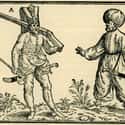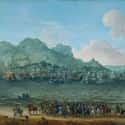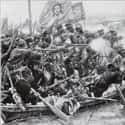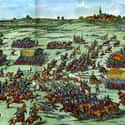-
(#11) The Ottoman Empire Was Devastated By Famine And Warfare
The Ottoman Empire, present-day Turkey, was not immune to the global devastation of the General Crisis. The Empire's population had steadily grown throughout the 16th century, but this trend eventually reversed itself radically. In the first half of the 17th century, some areas experienced population losses of as high as 80%. The decline was so severe that it would take two centuries for the population to return to pre-17th century levels. Internal rebellions and continued defeats at the hands of the Austrians would make life in the Ottoman Empire difficult for much of the century.
-
(#8) 35,000 Men, Women, And Children Were Executed In Japan For Rebelling
In 1637, Christian peasants in Japan engaged in what was known as the Shimibara Rebellion. Like lots of other rebellions happening during the General Crisis, this revolt stemmed from famine, high regional taxes, official persecution - including execution by scalding in volcanic pits - and forced labor. The Tokugawa shogunate would eventually put down the revolution and behead over 35,000 men, women and children, essentially the remaining Christians not killed in the bloodshed. Government losses were estimated at double that of the Christian Japanese. Because Portuguese residents were considered the source of Christianity, all Westerners were expelled and forbidden to enter Japan, and Christianity was officially forbidden, policies that would remain in effect for over 250 years.
-
(#9) In England, A Monarch Was Executed And Civil War Spanned A Decade
In 1642, tension between the Monarchical and the Parliamentary (who opposed direct rule by King Charles I) factions of England resulted in an extended period of civil wars. The first of these civil wars would conclude in 1646 with the imprisonment of Charles I and Parliamentarians essentially in control of England. A second civil war broke out in 1648 when Scottish elements attempted to restore Charles I to the throne. This effort also failed quickly and resulted in Charles I's execution for treason in 1649. A third civil war spread to Ireland in 1649 and resulted in the brutal oppression of Catholic "heretics" by a Parliamentary army lead by Oliver Cromwell. This resulted in the confiscation of all Irish Catholic property and its redistribution to English Protestants. Another Monarchical defeat in England at Worcester in 1651 established a united England under the rule of Oliver Cromwell, essentially a military dictator. The estimate of death from warfare or warfare-related disease during these conflicts is about 200,000.
-
(#12) Spain Lost Its Status As A World Power
The 17th century introduced a decline, both politically and economically, in Spain. Philip II, the last great ruler of the Spanish Empire, died in 1598. In addition, the Spanish military was greatly affected by the 1588 disaster of the Spanish Armada. Spain's military power would be further diminished by another naval disaster in 1639 as well as defeat at the hands of France in 1643. Plague greatly reduced the population throughout the century, especially in the formerly prosperous towns of Grenada, Segovia, and Toledo, resulting in economic recession. In 1630, Spain had an army estimated at 300,000 men; by 1700, this had been reduced to 50,000.
-
(#5) The "Time Of Troubles" In Russia Resulted In The Deaths Of Millions
At the start of the 17th century, Russia was greatly affected by the chaos, warfare, and famine happening in and around it. Affected by the agricultural issues associated with the Little Ice Age, famine killed over two million Russians - a third of the nation - between 1601 and 1603. The end of the Rurik Dynasty also fomented political conflict that left the government in chaos, providing an opportunity for an invasion of Russia by Polish-Lithuanian forces who wreaked tremendous destruction until a Russian revolt expelled the invaders. The end of this "Time of Troubles" is traditionally ascribed to the coronation of Michael Romanov as Tsar in 1613.
-
(#4) The Thirty Years' War Wiped Out 20% Of Germany
One of the many population-crashing incidents that occurred during the era known as the General Crisis was the the Thirty Years War, a conflict that started in 1618 over religious issues concerning the Holy Roman Empire. By its conclusion in 1848, it would involve every major power in Europe, including France, Sweden, Spain, and Austria. Heavy use of mercenary armies in the War, along with their violet and brutal tactics, led to massive population losses in some places. Among German states, for example, there was a 20% population loss with some areas experiencing a decline of 50%. In 1648, the hostilities ended with the Treaty of Westphalia, but not before populations and industries had been totally wiped out.
New Random Displays Display All By Ranking
About This Tool
Since the 20th century, Western academia has conducted a debate around the general crisis of the 17th century, which has promoted the understanding of early modern European history. The 17th century was a period of such an important and intense crisis. This period was a crucial transition in the development of European society from the Middle Ages to modern society.
The world experienced the economic recession, rising population mortality, bourgeois revolution, social turmoil, and many other social problems, global connections were also strengthened during this period. The random tool described 13 details about the harsh life of the general crisis.
Our data comes from Ranker, If you want to participate in the ranking of items displayed on this page, please click here.
















